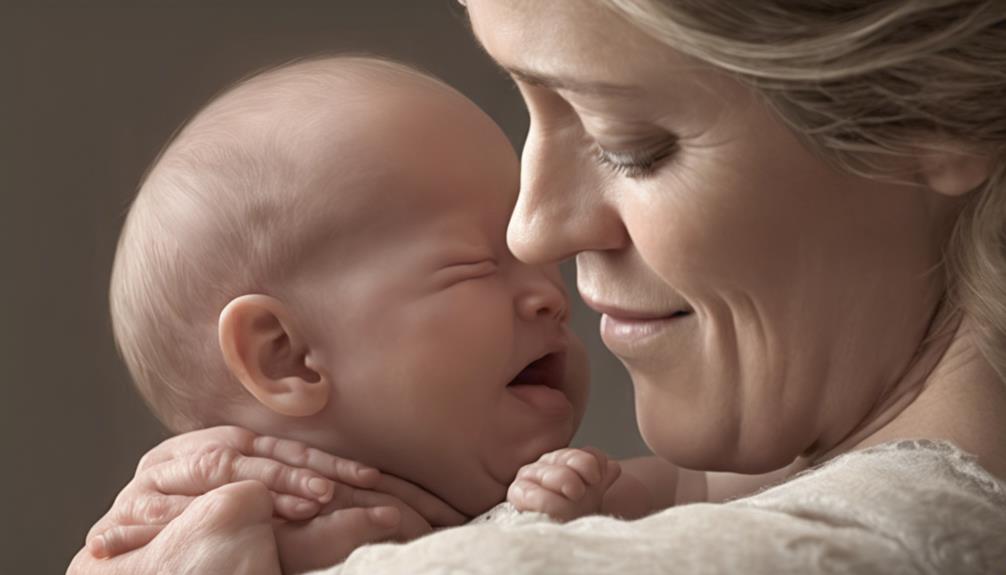When it comes to calming hiccups in a newborn after feeding, navigating through the process can seem like unraveling a fragile knot. However, don’t worry, as there are straightforward yet effective methods that can offer relief for your baby.
From gentle patting to specialized feeding positions, each step in this guide aims to offer you a roadmap to comfort your baby. So, let's explore these steps together and help your newborn find ease after mealtime.
Key Takeaways
- Newborn hiccups are common post-feeding due to immature digestive systems.
- Patting or rubbing the back helps relax the diaphragm and alleviate hiccups.
- Holding baby upright after feeding aids digestion and reduces hiccups.
- Proper positioning during and after feeding minimizes air intake, preventing hiccups.
Common Causes of Newborn Hiccups
Newborn hiccups often occur in babies due to the immaturity of their digestive systems. When your little one experiences those adorable yet sometimes worrisome hiccups, it could be because they swallowed air during feedings. The immature nerve pathways in newborns can also play a role in triggering these hiccups.
Sometimes, overfeeding or feeding too quickly can lead to those rhythmic jerks after meals. It's crucial to remember that these hiccups are typically harmless and often resolve on their own. Your baby's body is still adjusting to the new world outside the womb, and these hiccups are just a part of that process.
As you navigate the early days with your newborn, know that these hiccups are a common occurrence and usually nothing to be concerned about. Just keep an eye on your little one, offer comfort, and know that this phase will pass soon.
Gentle Techniques for Soothing Hiccups
If your little one is experiencing hiccups after feeding, there are gentle techniques you can use to help guarantee them. Patting or rubbing your baby's back gently can relax the diaphragm and alleviate hiccups. Holding your baby upright for around 30 minutes after feeding aids in digestion and reduces the chances of hiccups occurring. Offering a pacifier post-feeding can help calm the diaphragm and possibly halt hiccups. Confirming a proper latch and minimizing air intake during feeding by adjusting positions can prevent hiccups. Regularly burping your baby during and after feeds releases trapped gas, preventing post-feeding hiccups.
| Technique | Description |
|---|---|
| Patting or rubbing back | Helps relax the diaphragm, soothing hiccups. |
| Holding upright | Aids digestion and reduces post-feeding hiccups. |
| Offering pacifier | Calms the diaphragm and potential stop hiccups. |
| Adjusting feeding | Confirms proper latch, minimizes air intake, prevents hiccups. |
| Regular burping | Releases trapped gas, prevents hiccups after feeds. |
Positioning Tips for Hiccup Relief

To enhance your baby's comfort and reduce post-feeding hiccups, focus on prime positioning techniques that promote digestion and minimize air intake.
After feeding, hold your baby upright for at least 30 minutes to prevent hiccups caused by air swallowing. While in this position, gently pat or rub your baby's back to help alleviate any hiccups that may arise.
Avoid laying your baby flat immediately after feeding to prevent hiccups due to stomach pressure; instead, opt for an inclined or semi-upright position during and after feeding.
By utilizing proper feeding techniques and positions, you can prevent your baby from swallowing excess air, which often leads to hiccups.
Effective Burping Methods After Feeding
After focusing on prime positioning techniques for relieving hiccups, now let's explore effective burping methods to help release trapped air in your baby's stomach after feeding. Burping is an important step in aiding your baby's digestion and reducing discomfort caused by trapped gas. To effectively burp your baby, try holding them against your chest with their chin resting on your shoulder. Gently pat or rub their back in an upward motion to encourage the release of trapped air. Remember to burp your baby for at least 5-10 minutes after each feeding session to prevent gas buildup, which can lead to hiccups.
For bottle-fed babies, burping every 2-3 ounces can help minimize air ingestion and potential hiccups. By adopting proper burping techniques, you can soothe your baby, prevent discomfort, and promote better digestion. Consistent burping not only aids in releasing trapped air but also fosters a more comfortable feeding experience for your little one. So, make burping a part of your post-feeding routine to guarantee your baby's well-being.
Knowing When to Seek Medical Advice

When newborn hiccups persist for more than 10 minutes after feeding, seeking medical advice is recommended to ascertain your baby's well-being. It's vital to pay attention to your baby's cues and know when to reach out to a healthcare provider. If your baby's hiccups are accompanied by frequent spitting up or signs of discomfort, it's wise to contact a medical professional. Persistent hiccups that interfere with feeding or disrupt your baby's sleep should also prompt you to seek medical advice. Consult a pediatrician if the hiccups cause your baby distress or impact their weight gain. Remember, persistent hiccups in newborns might signal underlying issues that require attention. Here's a table summarizing when to seek medical advice for your baby's hiccups:
| Signs to Watch For | Action to Take | Importance |
|---|---|---|
| Hiccups lasting over 10 minutes after feeding | Seek medical advice | Indicates potential issues |
| Hiccups with frequent spitting up or discomfort | Contact healthcare provider | Ensure baby's well-being |
| Hiccups affecting feeding or sleep | Medical attention necessary | Address potential concerns |
| Hiccups causing distress or affecting weight gain | Consult a pediatrician | Monitor baby's health closely |
| Persistent hiccups indicating underlying issues | Visit a healthcare provider | Investigate potential problems |
Frequently Asked Questions
How Can I Help My Baby With Hiccups After Eating?
To help your baby with hiccups after eating, try burping gently, holding upright for 30 minutes, patting their back, offering a pacifier, and adjusting feeding positions. These steps can ease discomfort and soothe your little one.
How Do You Comfort a Newborn With Hiccups?
To comfort a newborn with hiccups, gently pat their back, hold them upright after feeding, offer a pacifier for sucking, and create a peaceful atmosphere. Avoid overfeeding to prevent hiccups. Stay calm and soothe your little one with care.
How Do I Get Rid of My Baby's Hiccups Asap?
To get rid of your baby's hiccups asap, burp them, offer a pacifier, gently rub their back, adjust feeding positions, and confirm a proper latch. These steps help release trapped air, relax the diaphragm, and prevent hiccups caused by swallowing air too quickly.
Is It OK for My Newborn to Hiccup After Feeding?
Totally normal for your newborn to hiccup post-feeding! Hiccups help their tiny system, so relax. Most times, they fade solo. Just watch for any unusual signs. Enjoy this hiccupy phase; it's part of the baby magic!
Conclusion
Congratulations! You're now a certified hiccup whisperer for your newborn. Remember, hiccups are just a tiny hiccup in the grand scheme of things, so don't let them ruffle your feathers. Keep using those soothing techniques and creating a peaceful feeding environment.
And if those hiccups persist, don't hesitate to seek medical advice. Your baby's comfort and well-being are always a top priority. Happy hiccup soothing!










